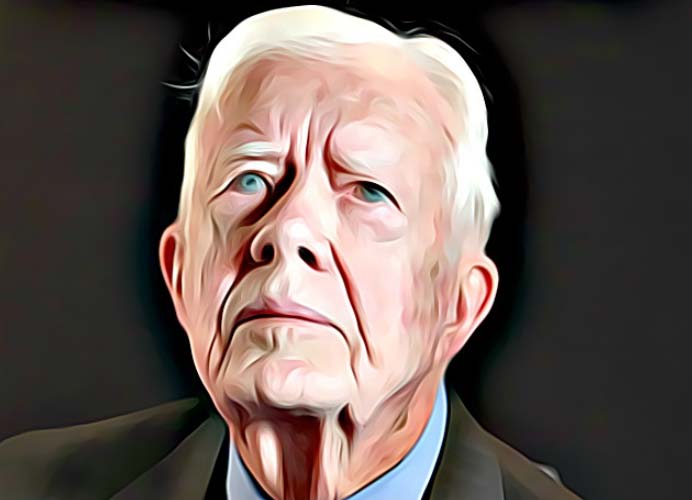
Carter on Friday offered some rather unvarnished comments strongly suggesting that Trump is an illegitimate president - just days after he praised Trump's restraint on Iran and a couple months after Trump consulted him on China-related issues.
"I think the interference, although not yet quantified, if fully investigated would show that Trump didn't actually win the election in 2016," Carter said at a panel discussion hosted by his eponymous Carter Center in Leesburg, Virginia. "He lost the election, and he was put into office because the Russians interfered on his behalf."
Asked whether he was calling Trump an illegitimate president, Carter didn't back down: "Based on what I just said, which I can't retract."
The comments will clearly cross Trump's red line when it comes to the idea that he needed Russia to win. But they also cross another line: Between complete speculation and provable fact.
Carter's theory is that a "full investigation" would prove Russia made the difference in electing Trump. This is an altogether plausible and reasonable theory. Trump, after all, won by less than 1% - less than 80,000 combined votes - in the three states that mattered: Michigan, Pennsylvania and Wisconsin.
All Russia would have had to do is change the votes of those fewer than 80,000 people, or get 80,000 people whose votes would have canceled those out to stay home, or spur 80,000 people to vote Trump who wouldn't otherwise have voted (or some combination of these).
If it shifted the national race by just one percentage point, it made the difference. The race was so close, in fact, that you could argue any number of things were decisive: James B. Comey's late announcement, media coverage of Hillary Clinton's emails, Clinton's "deplorables" comment, the weather on Election Day, etc., etc.
And when Republicans and Trump dismiss the idea that Russia actually had any impact, they're making a rather ridiculous argument. Don't forget that the Democratic emails they hacked were big news for days.
Also don't forget that John Podesta's emails were released within about an hour of the Trump "Access Hollywood" tape. Russia wasn't proven to have manipulated vote totals directly, but it could have manipulated some people's voting preferences. In fact, it's virtually certain that it did, at least to some extent; the only question is how many, and whether it was enough to make the difference.
At the same time, Carter's theory that an investigation would somehow prove this is pretty ridiculous. This is even more unknowable than whether Comey or Clinton's emails or her "deplorables" comment decided things. That's because it's an event that took place over an extended period of time - multiple periods of time, in fact - including long before the election.
It also may have impacted people's voting preferences in ways they might not even recognize. People might look at a particular event and be able to say, "Yeah, that changed my mind" or "That mattered to me," but far fewer people are going to essentially say, "Yeah, an antagonistic foreign country manipulated me into voting that way." Trump voters are reluctant to even concede that Russia tried to interfere, much less that it succeeded in swaying them.
Somehow proving Russia made the difference would involve going back to 2016, reading people's minds about their voting preferences and choices, and replaying the whole situation with none of those hacked emails being released. You could run a very complex political science study in which you compared people who didn't pay attention to that news to those that did, for example.
But there would be so many other variables, and it's unlikely anything would truly be proven in a statistically significant way, at which point you could say, "It's proven Trump wouldn't have won without this."
From there, it's worth asking whether Carter's comments are helpful. Many liberals and Trump opponents will likely be happy to see a former president raising this issue, because they too believe Trump is illegitimate. But this is not an allegation many high-ranking members of the Democratic Party have trafficked in. And that's both because it's unknowable and because it's probably not great for democracy.
Unless you can truly prove it, labeling Trump an illegitimate president is the kind of thing that can destabilize the country - which, as it happens, is precisely what Vladimir Putin and Russia aimed to do with their 2016 interference. According to the U.S. intelligence community, supporting Trump was merely a means to that end.
But what about the Russia investigation?, you might ask. Didn't that run the same risk? Trump and his supporters have occasionally made the case that a two-year investigation that ripped the country in half was precisely what Russia would have wanted.
But at least in that case, there was a need to figure out what happened to avoid a repeat and for accountability, and there was some chance of a resolution. Speculating about whether Russia made the difference in Trump's 2016 win isn't nearly so fruitful an exercise, and I suspect many Democratic leaders would agree.
Sign up for the daily JWR update. It's free. Just click here.
(COMMENT, BELOW)


 Contact The Editor
Contact The Editor
 Articles By This Author
Articles By This Author